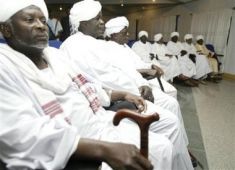Mediators extend Darfur talks deadline again
May 2, 2006 (ABUJA) — African Union (AU) mediators said they had extended the deadline for reaching agreement in the Darfur peace talks for a second time, giving negotiators a further 48 hours until Thursday night to strike a deal.
 The government of Sudan has accepted an 85-page draft settlement designed to end fighting that has killed tens of thousands. But three Darfur rebel factions refuse to sign, saying they are unhappy with the proposals on security, power-sharing and wealth-sharing.
The government of Sudan has accepted an 85-page draft settlement designed to end fighting that has killed tens of thousands. But three Darfur rebel factions refuse to sign, saying they are unhappy with the proposals on security, power-sharing and wealth-sharing.
“The deadline was put back by 48 hours,” said AU spokesman Noureddine Mezni.
He said Nigerian President Olusegun Obasanjo had requested the extension so that a group of African heads of state who are due on Wednesday in the Nigerian capital Abuja, the talks venue, could participate. The leaders were due to attend a health conference.
The AU had already extended the original deadline, midnight on April 30, by 48 hours after the rebels rejected the draft settlement.
U.S. Deputy Secretary of State Robert Zoellick, who flew to Abuja earlier on Tuesday to increase pressure on the rebels, had already said he would continue negotiations on Wednesday.
British International Development Secretary Hilary Benn and numerous diplomats also converged on Abuja to press for a deal to wrap up two years of arduous talks.
In public the rebels insist some of their demands, such as a vice president’s post and a regional government, be met in full, though mediators say months of negotiations have shown compromises with Khartoum are necessary.
Zoellick said that some, though not all, of the rebels had seemed more open to compromise in private meetings.
The second deadline of 2300 GMT on Tuesday had been widely expected to slip as AU Chairman Denis Sassou Nguesso, the president of Congo Republic, and AU commission head Alpha Oumar Konare were due to arrive in Abuja only on Wednesday.
HIGH COST OF FAILURE
Observers say failure to get a deal would be disastrous.
“Nobody will look good, the AU, the government or the (rebel) movements, but the real victims will be the people on the ground,” said Sam Ibok, head of the AU mediation team.
“They will not be able to return to their homes to cultivate their lands. They will have to spend more time in camps. Security will deteriorate. Women will continue to be exposed to rape and children will continue to suffer,” he said.
The rebels took up arms in early 2003 in ethnically mixed Darfur, an arid region the size of France, over what they saw as neglect by the Arab-dominated central government.
Khartoum used militias, known as Janjaweed and drawn from Arab tribes, to crush the rebellion. The fighting has killed tens of thousands of people while a campaign of arson, looting and rape has driven more than 2 million from their homes into refugee camps in Darfur and neighbouring Chad.
Washington, which labels the violence in Darfur “genocide”, is intensifying efforts to resolve the Darfur conflict.
President George W. Bush has called his Sudanese counterpart Omar Hassan al-Bashir to emphasize the need for a robust U.N. force to take over peacekeeping in Darfur from a 7,000-strong AU mission, White House spokesman Scott McClellan told reporters.
Khartoum has so far rejected the idea.
In Abuja, U.S. diplomats are trying to engineer a last-ditch deal whereby the sides would trade concessions on two contentious security issues.
Under their proposal, a part of the AU draft requiring the government to disarm the Janjaweed before the rebels lay down their weapons would be amended to suit the government better.
In return, Khartoum would accept a detailed plan for integration of specific numbers of rebel fighters into the Sudanese security forces — a key rebel demand.
Diplomats said one of the main stumbling blocks to a peace agreement was that Minni Arcua Minnawi, leader of the most powerful of the three rebel factions, was being undermined by some of his former allies because of a crisis in Chad.
Minnawi is a tribal ally of Chadian President Idriss Deby, who is battling an insurrection by fighters he accuses of fronting for Sudan. But Minnawi’s friends in Chad accuse him of abandoning Deby and selling out to Khartoum, which makes it difficult for him to sign any deal.
(Reuters/ST)
